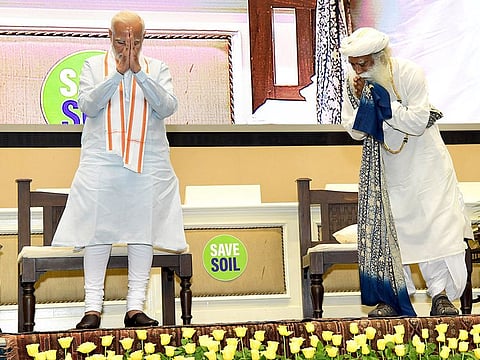Our march towards a more conscious planet
Save Soil Movement is a global initiative to increase awareness about deteriorating soil

On June 5th, which was World Environment Day, I found three signs of hope. First of all, early in the morning, we had an unusual visitor in our garden. It was a perfectly camouflaged snake, over five feet long, slithering through our China orange tree. It was colour coordinated so well with the tree, in superb beauty and symmetry, that unless you looked closely, you would not notice it at all.
Not being a snake expert, I couldn’t tell what snake it was. When we spot a snake the first thought that crosses our mind is whether it is poisonous. The onlookers give unasked for advice: “Don’t take a chance. Better kill it.” My gardener, who had spotted it, actually had words with it, “Look here now. You better be on your way. Else, maar khayega—you’ll be beaten up.”
Perhaps, getting the drift, the creature went out, then slid back in when I went after to look, finally, exiting our premises through a gap in the wall at ground level. I was so glad we had not harmed it. Later, trying to identify it, I discovered that it was probably an Indian rat snake, very much a part of the natural eco-system, keeping the rodent population in check.
We share out beautiful planet with so many other beings. They all have a right to live. But when will human beings learn that the mantra of survival is live and let live. Not live and let die.
Later in the day, there was an important meeting at Vigyan Bhavan, in which Sadhguru Jaggi and Indian Prime Minister Narendra Modi shared the stage. Sadhguru highlighted that much of the food produced on earth comes from the top soil, which is being washed away or turned into a desert at an alarming rate.
Our collective responsibility
It is our responsibility to save it. He said that in his multi-nation tour to enhance soil awareness, he was constantly being asked, “Whom are you against?” He said we are not against anyone, any company or business or lobby or special interest group. We are only against suicide, which the human race is hurtling towards if we do not make ourselves more conscious.
Modi said, rather movingly, “The soil or land is one of the five elements. We proudly apply it to our forehead as a mark of respect. We grow up falling and playing on the soil. … I am happy that in the last eight years, the country has worked relentlessly to keep the soil alive. To save the soil, we have focused on five main things. First, how to make the soil chemical free.
Reduction of the forest cover
Second, how to save the creatures that live in the soil, which in technical language you call Soil Organic Matter. Third, how to maintain soil moisture, how to increase the availability of water. Fourth, how to remove the damage that is happening to the soil due to loss groundwater. And fifth, how to stop the continuous erosion of the soil due to the reduction of the forest cover.”
Modi also spoke of other achievements such as the reduction of dependency on imported oil with domestic ethanol. The 10% target, he said, had been met before time. We can overcome climate change only by changing our lifestyle.
He called it “Lifestyle for Environment, Mission Life,” the beginning, no less, “of a mission to change the fate of the earth in this century”.
Awareness on environmental issues
The third story concerns Dr Kiran Seth, a former professor at Indian Institute of Technology-Delhi, and a friend. Kiran, 73, bicycled 2500 km to raise awareness on environmental issues. He had begun his journey on March 11, 2022 and finished it on June 5, World Environment Day. Kiran is better knows as the founder of SPIC-MACAY, the Society for the Promotion of Indian Classical Music And Culture Amongst Youth.
He discovered Indian classical while he was a student at Columbia. On returning to India, he made it his mission to preserve, protect, and promote it. SPIC-MACAY is still active, with over 300 chapters in India and overseas.
Finishing his bicycle awareness drive at Mahatma Gandhi’s samadhi at Raj Ghat, he said the three aims of his ride were to emphasise “simple living and high thinking, to raise awareness about the environment and make students familiar with Indian culture.”
He covered Delhi, Jaipur, Ahmedabad, and Ujjain during this journey, but wishes to cycle from Kashmir to Kanyakumari later to mark “the 75th year of India's Independence and pay homage to Mahatma Gandhi.”
The snake in our garden, the save soil campaign, and bicycling to raise awareness—are all linked. They are ways to make the earth a more conscious planet. So is this article, I hope.




